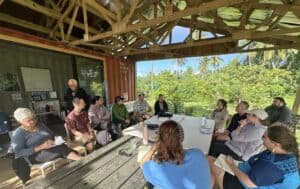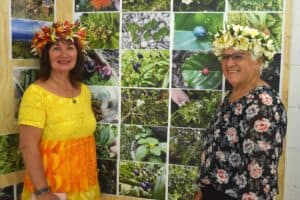For the past few months, they have been encouraging people to help protect the streams in Muri, through clearing of invasives and planting.
Anne Tierney of Muri Environment Care Group (MECG) says they have been “playing in the mud basically” with an aim to “try and reduce the amount of dirt that comes down from the hills and goes out into the lagoon”.
Aremango stream in particular, has been struggling under the spread of the invasive water spinach plant, kang-kong (Ipomoea aquatica).
This plant is a popular food source in south-east Asian cuisine, and does have the beneficial ability to take nutrients out of flowing water.
However, kang-kong is invasive and doesn’t provide a deep or spreading root structure necessary to mitigate long term erosion of the stream banks. This, plus its aggressive nature, makes it too difficult to work with in the early stages of stream restoration.
Much of the 800 metres stream section from the lagoon edge to the main road has already been cleared by the resident and business community. Wednesday morning planting sessions have now seen large sections of the stream planted in vetiver.
The landowners alongside the stream will continue to look after these planted areas going forward. Pacific Resort has been a very strong supporter, sending a large number of staff along to help each week.
Anne says “vetiver is quite a magical plant, and is popular all over the world. The roots grow strong and deep to stabilise the banks.
The seeds are sterile so it is not invasive and more or less stays where you put it. Quite a bit of the stream is armoured with rock walls so at a later date we’ll revisit to plant those areas up so that everyone has a protected attractive area worth protecting!”
Helping with the planting plan is ecological restoration adviser Brennan Panzarella who advocates for incorporating a diversity of native and useful species whenever possible.
Brennan explains “mixed planting is very important to achieve a range of deep, medium and surface roots. The aim being to stabilise the banks against flood waters, and to retain/filter top soil.
“Our solution for the first stage of stream restoration is to use primarily vetiver to stabilise the stream banks with tightly spaced plants more or less on contour.
This, in order to limit the effects of flood wave action and flow speed, especially in severe rain events.
“Considering the very public and visible nature of the current plantings in progress along sections of Aremango, we are keen to use Cook Islands medicinal plants recommended by the community, and a few of the classic and beautiful species.
“We will then be experimenting with water loving but also robust species like the umbrella sedge to see if we can stabilise stream banks that are frequently at or under the stream’s water level”.
MECG say they have been lucky to have the support and advice from staff at the National Environment Service and Ministry of Marine Resources (MMR), all of whom are passionate, knowledgeable people who want to help and do a good job.
They also wish to thank MMR and the Ministry of Agriculture (MoA) for supporting this project and providing 1000 plants to get it underway.
The next step will be looking at the remaining streams in Muri.
Anne believes this is a great opportunity for all to work together to better protect our land and lagoon, working towards the future for our kids on this beautiful island.
Keep an eye on the Muri Environment Care Group Facebook page if you want to join in on planting days.



